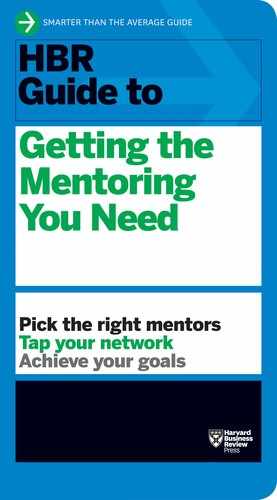Chapter 10
Employ a Personal Board of Directors
by Priscilla Claman
Like avocado-colored appliances, traditional mentoring is something you don’t see much anymore. Yes, corporate-sponsored mentoring programs will always improve personal exposure and connections. But the career strategy of hitching your future to some rising manager is outdated.
That’s partly because midlevel and senior managers are no longer the ones with stable jobs. Many organizations are dealing with restructuring, downsizing, acquisitions, mergers, and, of course, recessions—so your mentor is just as likely to move on or be laid off as you are. And if you are considered her special protégé, you may lose your job when she does.
Another reason one mentor alone won’t cut it is that no single person can possibly give you all the guidance and nurturing you’ll need to reach your potential. Even the wisest, most insightful people have blind spots, and even the most loyal and committed mentors can offer you only so much of their energy and time.
What you need instead is a board of directors for your career, a group of people you consult regularly to get advice and feedback on matters ranging from job performance to career advancement to personal enrichment. There’s no need to hold meetings or even inform each person of his or her status as a board member—but you do need to select the right people, stay in touch, and reciprocate their generosity.
Just like any good board, the people you choose should make different contributions to your thinking about how to reach your professional and personal goals. You might want to include your boss or a colleague you admire—or both. If you are a senior manager, consider job search professionals, academics, and consultants with expertise in your specialty. The people on your board should know more than you about something, be better than you at something, or offer different points of view. Putting only buddies on your board won’t help you grow and develop.
Worried that assembling your board will take too much time away from your work? It’s actually not all that time-consuming—and your board will help you do your job better and more efficiently, especially if you’ve been placed in a role before you’re fully equipped to handle it. The key is to match up your weaknesses with others’ strengths—and, so you can give as well as get, your strengths with their weaknesses.
For example, I often go to my friend Ted, an expert in the world of finance, with questions like “What do the Basel Accords really mean?” and “Why did my corporate client’s stock shoot up?” (Names in this article have been changed.) He is full of statistical information, but when he is looking for some up-to-date hunches, like what I think is going on in the job market, he calls me.
I get in touch with Kerry, a former colleague of mine who has a gift for delivering bad news, when I have something particularly difficult to communicate. For instance, Kerry helped me come up with an effective way to tell an upset client why I thought his employer wasn’t giving him the promotion he thought he deserved. Kerry turns to me when he has a hard job to fill and wants some leads.
Pat, a longtime client of mine, goes to all the conferences in our field, and she always knows the latest theories and research, so I check in with her periodically to find out what’s new. She introduced me to concepts in emotional intelligence and neuroscience long before they became trends. And because she knows I enjoy batting around training ideas, she asks me for suggestions when she’s looking for a creative new training exercise.
I have learned from each of these folks. They know I think highly of their advice, and I do what I can to help them in return.
Mentoring from a personal board is also invaluable if you’re making a career transition. Ellen, another client of mine, took six years off from a demanding technology career to raise her children. When she was ready to return to work full time, she looked for advice on how to make the transition. She sought out a former colleague, and he was candid: Her technical skills just weren’t up-to-date. With his assistance, Ellen identified the new software she needed to know and took a training class. When she asked for extra help in the class, the instructor found her a software coach, and the coach got her connected with a user group. Then, the user group connected her with a headhunter, who told her he could find her a job if she were certified in the software. While working toward the certification, Ellen regularly stays in touch with her former colleague, the instructor, her software coach, and the headhunter to make sure she is on track.
No single mentor could have made the contributions to Ellen’s career that all these individuals did. Finding and tapping her personal board members required some elbow grease, but it paid off.
Go forth and consult your own network. Instead of relying on a single upper-level manager, assemble a team of specialists for yourself as if you were creating a company’s board of directors. Their combined efforts could yield real results for you.
____________
Priscilla Claman is the president of Career Strategies, a Boston-based firm offering coaching to individuals and career management services to organizations. She is a former corporate human resources executive and the author of Ask . . . How to Get What You Want and Need at Work (Insights, 2002).
Adapted from content posted on hbr.org on October 20, 2010
